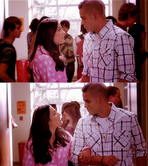November 4, 2010 by Emma Gray
The Glee is Mine
 I am a 23-year-old aspiring writer and I moved to New York City just over a month ago. (I’m a newcomer to the Lilith blogosphere, and as someone who strongly identifies as a young Jewish feminist, it seems like a match made on JDate.) I’ll be exploring the way that pop culture intersects with and shapes identity – specifically my identity as a Jewish woman.
I am a 23-year-old aspiring writer and I moved to New York City just over a month ago. (I’m a newcomer to the Lilith blogosphere, and as someone who strongly identifies as a young Jewish feminist, it seems like a match made on JDate.) I’ll be exploring the way that pop culture intersects with and shapes identity – specifically my identity as a Jewish woman.
Glee is a TV show that has brought nothing but joy into my life. Not only has it produced a slammin’ cover version of “The Boy Is Mine,” (I’ll admit I’m a sucker for ’90s Brandy), but it also touches upon some potent issues. Musical theater and a progressive social message all in one? Pretty much a dream come true.
The most wonderful thing about Glee is how thought provoking it is. The most recent episodes have touched upon an array of issues, from male body image to the fluidity of sexuality. (Side Note: I’m completely obsessed with Brittany and Santana’s lady-loving.)
It has also been interesting to watch the way that the show deals with its Jewish characters.
In episode 7 of Season 1, “Throwdowns,” Sue Sylvester (the glee club’s cheerleading coach/nemesis) divides the glee kids up in an attempt to turn them against each other. She forms a group dubbed “Sue’s Kids,” of all the minority students, referred to by names like “gay kid, Asian, other Asian, Aretha.” Noticeably absent from this group of minority misfits? The Jewish characters – Rachel and Puck.
Rachel and Puck are grouped with the likes of WASP-y Quinn and blonder-than-blonde Brittany. They are very clearly the white privileged kids. It makes sense, and I am in no way indignant that these characters didn’t make the “minority cut.” But it did make me think about what it means to be an invisible minority, which is exactly what I am as a pale-skinned, Ashkenazi Jew.
Light-skinned, American Jews have access to white privilege – I don’t view this as debatable. Yet I have always felt acutely aware of my cultural difference. In a sea of Christianity, I was constantly called upon to speak for all Jews as the authority on holidays, culture and history in my public high school, and my culturally Jewish summer camp was a haven for discussing things that I couldn’t in the outside world. At least in the unscientific survey of my own experiences, Judaism has been (and continues to be) a differentiating factor from white America, while simultaneously being a part of that white America. What is the significance of this paradox? As a simultaneous insider and outsider maybe I am in a perfect position to change a flawed system of privilege.
Or maybe I’m simply over-thinking this. Am I just “playing the ethnicity card” to feel different in the mass of privileged white people? Or does being Jewish (and a woman – I didn’t even touch on male privilege in this post) really place me into a gap in American society, somewhere between the white standard and the “other”?
To be honest, I don’t know the answer. But thanks for bringing up some damn good questions, Rachel Berry. Until next time, in the indomitable words of Noah Puckerman: “Shalom.”
–Emma Gray
 Please wait...
Please wait...
Pingback: Tweets that mention The Glee is Mine | -- Topsy.com